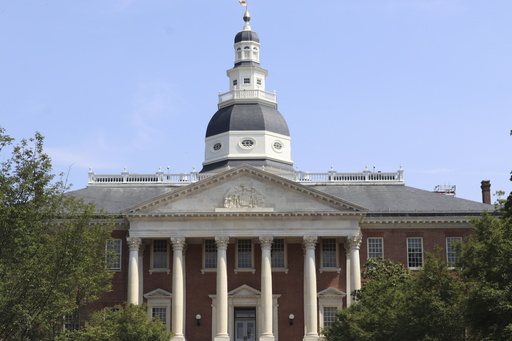ANNAPOLIS, Md. (AP) — Maryland vehicle registration fees and tobacco taxes rose Monday to help pay for transportation projects and education.
State lawmakers approved the vehicle registration hikes this year to help boost the state’s Transportation Trust Fund. Lawmakers also approved new weight classes that determine the fees. Motorists will pay the new rates the next time they register their vehicles. The increases run between 60% and 75%, depending on the weight of vehicles.
For passenger cars that weigh up to 3,500 pounds (1,588 kilograms), it will cost $221 every two years, or $110.50 annually. That’s up from $137 every two years that owners pay for passenger cars that weigh up to 3,700 pounds (1,678 kilograms).
Passenger vehicles that weight more than 3,500 pounds (1,588 kilograms) but less than 3,700 pounds (1,678 kilograms) will cost $241 every two years, or $120.50 each year in a newly created weight class. Passenger vehicles over 3,700 pounds (1,678 kilograms) will cost $323 for two years, or half that annually.
The vehicle fees include an increase in a surcharge from $17 to $40 each year to pay for rising costs to support emergency medical services.
Maryland also tacked on a new fee to ride-hailing services. The new fee is 75 cents per passenger trip, or 50 cents for each shared-passenger trip or trip in an electric vehicle.
The state also added a new annual surcharge for electric vehicles, set to $125 for zero-emission vehicles and $100 for plug-in electric vehicles. The surcharge is geared toward making up for gas taxes that owners of these vehicles don’t pay to support transportation projects.
Actions taken by the General Assembly in budget legislation this year are expected to add $233 million to the state’s Transportation Trust Fund in the fiscal year that began Monday, and increase to $328 million by fiscal 2029, according to analysts for the legislature.
A variety of tobacco tax increases also took effect, including an additional $1.25 tax on a pack of cigarettes. That raises the state’s tax on a pack of 20 cigarettes from $3.75 to $5. The tax on other tobacco products, excluding cigars, went up 7% to 60% of the wholesale price. The sales and use tax on electronic smoking devices increased from 12% to 20%.
The state estimates that the tobacco tax increases will help generate about $91 million for K-12 education, though that is estimated to drop off in future years due to a projected decline in tobacco use.
The tobacco tax increases are focused on contributing to the state’s K-12 education funding plan known as the Blueprint for Maryland’s Future, which phases in larger amounts of money to expand early childhood education, increase teachers’ salaries, and provide aid to struggling schools.
Here’s a look at some other new Maryland laws that took effect Monday:
INDOOR VAPING BAN
Maryland’s ban on smoking in public indoor areas, places of employment and mass transit systems was extended to vaping.
CHILD POVERTY
Gov. Wes Moore’s plan to fight child poverty, called the ENOUGH Act, took effect. It’s a statewide effort to channel private, philanthropic and state resources to communities with the highest rates of generational child poverty.
ACTIVE SHOOTER DRILLS-RULES
The state barred active shooter drills or trainings in schools from including specified activities that could be traumatic for students or school personnel. Local school systems also will have to notify parents in advance of active shooter drills or training.
ANKLE MONITORING
A workgroup was reestablished to study and make recommendations regarding the costs and availability of publicly and privately provided pretrial home detention monitoring systems. Lawmakers passed the measure after learning that a program that paid for private pretrial monitoring of poor defendants ran out of federal funds.
ALCOHOL DELIVERY
The state will create a local delivery service permit to allow delivery of alcoholic beverages from a retail license holder.
—
Rephrased content:
Maryland has implemented new measures as of Monday to increase funding for transportation projects and education. Vehicle registration fees have been raised to bolster the state’s Transportation Trust Fund. The fee hikes, approved by lawmakers this year, are based on new weight classes, with increases ranging between 60% and 75%, depending on the weight of vehicles. Owners will pay the updated rates when renewing vehicle registrations, with costs varying from $221 every two years for passenger cars up to 3,500 pounds to $323 for vehicles exceeding 3,700 pounds. Additionally, a surcharge to support emergency medical services has been raised from $17 to $40 yearly.
Maryland has also introduced a fee for ride-hailing services, charging 75 cents per passenger trip, or 50 cents for shared-passenger or electric vehicle trips. Moreover, a new annual surcharge for electric vehicles has been established, set at $125 for zero-emission and $100 for plug-in electric vehicles, to compensate for gas tax revenue lost from these vehicles.
Legislation passed by the General Assembly is projected to inject $233 million into the Transportation Trust Fund for fiscal 2022, increasing to $328 million by fiscal 2029. The state has also raised tobacco taxes, including an additional $1.25 per pack of cigarettes, bringing the total tax on a pack of 20 cigarettes to $5. The tax on other tobacco products, except cigars, has surged 7% to 60% of the wholesale price. Furthermore, the sales tax on electronic smoking devices has risen from 12% to 20%, aiming to generate around $91 million for K-12 education, aligning with the Blueprint for Maryland’s Future for educational enhancement.
Several other laws have been enforced in Maryland, including an extension of the indoor smoking ban to vaping, the implementation of Gov. Wes Moore’s ENOUGH Act to combat child poverty, restrictions on traumatic activities in active shooter drills at schools, a review of home detention monitoring systems, and the creation of a local permit for alcohol delivery services.
